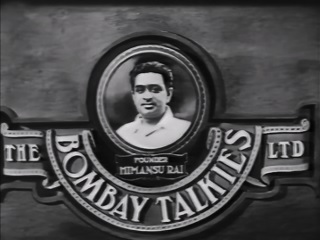
Devika Rani Chaudhuri, usually known as Devika Rani, was an Indian actress who worked in Hindi films. She was the first recipient of the Dadasaheb Phalke Award and was awarded the Padma Shri. Widely acknowledged as the First Lady of Indian cinema, Devika Rani is regarded as one of the greatest actresses. One of the highest-paid actress of the 1930s early 1940s, she appeared in Box Office India's "Top Actresses" list in 1940 and 1941.

Raj Kapoor was an Indian actor, film director and producer, who worked in Hindi cinema. He is considered one of the greatest and most influential actors and filmmakers in the history of Indian cinema, and has been referred to as The Greatest Showman of Indian Cinema and as the Charlie Chaplin of Indian Cinema.

The Dadasaheb Phalke Award is India's highest award in the field of cinema. It is presented annually at the National Film Awards ceremony by the Directorate of Film Festivals, an organisation set up by the Ministry of Information and Broadcasting. The recipient is honoured for their "great and outstanding contribution to the growth and development of Indian cinema" and is selected by a committee consisting of eminent personalities from the Indian film industry. The award comprises a Swarna Kamal medallion, a shawl, and a cash prize of ₹1,000,000 (US$12,000).

Prithviraj Kapoor was an Indian actor who is also considered to be one of the founding figures of Hindi cinema. He was associated with IPTA as one of its founding members and established the Prithvi Theatres in 1944 as a travelling theatre company based in Bombay.

Bombay Talkies was a movie studio founded in 1934. During its period of operation, Bombay Talkies produced 40 movies in Malad, a suburb of the Indian city of Bombay.

Alam Ara is a 1931 Indian Hindustani-language historical fantasy film directed and produced by Ardeshir Irani. It revolves around a king and his two wives, Navbahaar and Dilbahaar, who are childless; soon, a fakir tells the king that the former wife will give birth to a boy, later named Qamar, but the child will die following his 18th birthday if Navbahaar cannot find the necklace he asks for. Meanwhile, the king finds out that Dilbahaar falls for the senapati Adil, leading the king to arrest him and evicts his pregnant wife, who later gives birth to Alam Ara (Zubeida).

Ramesh Sippy is an Indian film director, actor and producer in Hindi cinema. He is particularly known for being director in Sholay (1975), which is regarded as one of the most influential films ever made in India. The Government of India honoured him with Padma Shri in 2013.
Gul Hamid (1905-1936) was an Indian actor. He started his acting career in silent films and later played leading roles in talkies. He had many honors to his credit. He acted in Heer Ranjha, the first film produced in Punjabi and in Seeta, a talkie that won an honorary diploma in the 1934 Venice Film Festival and that was also the first Indian film shown at an International film festival. Hamid also wrote the script, acted in, and directed the film Khyber Pass (1936). Hamid died of Hodgkin's Disease in 1936.

Debaki Bose (1898–1971), also known as Debaki Kumar Bose, was an Indian director, writer, and actor who is recognized for his contribution in Hindi as well as Bengali cinema. He was born on 25 November 1898 in Akalposh,, Burdwan, Bengal Presidency, British India. He died on 17 November 1971 in Calcutta, West Bengal, India. He is known for his innovative use of sound and music in Indian Cinema. He worked first under the banner of British Dominion Films of Dhiren Ganguly and later with Pramathesh Barua's Barua Pictures and finally he joined New Theatres banner in 1932. He started his own production company, Debaki Productions, in 1945.

Nitin Bose was an Indian film director, cinematographer and screenwriter of the nation's film industry. He was born in Calcutta and died in the same city. In the 1930s and early 40s, he worked with New Theatres, who made bilingual movies: in both Bengali and Hindi. Later, he moved to Bombay and directed under the banners of Bombay Talkies and Filmistan.

Kidar Nath Sharma, also Kedar Sharma, was an Indian film director, producer, screenwriter, and Lyricist of Hindi films. While he had great success as a director of movies including Neel Kamal (1947), Bawre Nain (1950) and Jogan (1950), he is most remembered for starting the acting careers of popular Bollywood actors like Madhubala, Geeta Bali, Raj Kapoor, Mala Sinha, Bharat Bhushan and Tanuja.
The East India Film Company was an Indian film production company, based in Calcutta, Bengal Presidency, British India. It was the first Indian film company to screen a movie at an international film festival. Started in 1932 in Calcutta, by R. L. Khemka, it went on to be a pioneer in producing films across the several regional film industries, including Bengali, Hindi, Urdu, Telugu, and Tamil, in the decade after its founding; till then, production companies were restricted regionally.
Kanjibhai Rathod was an Indian film director.

"Apna Bombay Talkies" is a Hindi song from the 2013 anthology film, Bombay Talkies. Composed by Amit Trivedi, the song is sung by Udit Narayan, Alka Yagnik, Kumar Sanu, Abhijeet Bhattacharya, Sonu Nigam, Kavita Krishnamurti, Sadhana Sargam, Sunidhi Chauhan, S. P. Balasubrahmanyam, Shaan, Shreya Ghoshal, KK, Sukhwinder Singh, Shilpa Rao, Mohit Chauhan, with lyrics penned by Swanand Kirkire.

Trilok Kapoor was an Indian actor and a member of the Kapoor family who worked in Bollywood films. He was the younger brother of actor Prithviraj Kapoor.
Mani Ratnam is an Indian filmmaker who works predominantly in Tamil cinema. Regarded as one of the greatest Indian filmmakers, he is credited with redefining the "range and depth of Tamil cinema". As of 2019, he has directed 28 films, and produced over 15 under his production company Madras Talkies.

Sita Kalyanam is a 1934 Telugu-language Hindu mythological film directed by Chitrapu Narasimha Rao and produced by Pinapala Venkata Dasu under the banner of Vel Pictures. The film stars Bezawada Rajaratnam, Master Kalyani, and Madhavapeddi Venkatramayya, with music composed by Gali Penchala Narasimha Rao. It is considered the first Telugu talkie to feature outdoor sequences and the first Telugu talkie produced in Madras. Additionally, it was the second Telugu talkie film produced by a Telugu person. Released on October 6, 1934, Sita Kalyanam was a commercial success.















